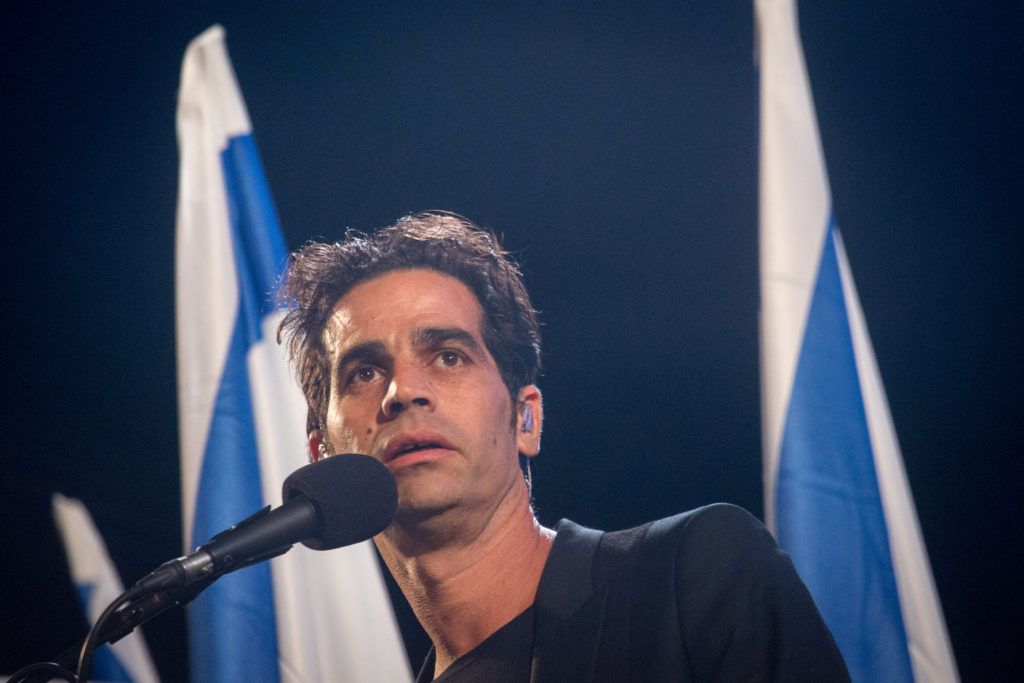Singer Aviv Geffen performed in the town of Beit El in Samaria for the first time, and his contrite monologue touched the audience.
By Batya Jerenberg, World Israel News
During his first performance in a town in Judea and Samaria, popular singer-songwriter Aviv Geffen apologized last week for having slammed the religious Right for years.
“It’s very moving to be here,” said Geffen, an icon of the Israeli Left, while onstage in Beit El recently. “As you know from the media, I went through a personal journey that was not simple and not short, and I came to a deep understanding that I and my brothers — you — were separated for many reasons and for many years, because of my real ignorance, and that I tried hard to please part of my audience.”
“I genuinely want to ask for your forgiveness,” he said, with his hand over his heart, and the audience erupted in cheers and claps.
“I’ve learned a lot… out of love, out of a sense of unity” with those who had been “the other” to him for so long, he continued. The singer credited “many friends” for helping him, including Interior Minister Ayelet Shaked.
Shaked, who is not religious, made her political home first among the religious Zionists of the Jewish Home party before breaking away with former prime minister Naftali Bennett to create Yemina as a mixed religious-non-religious right-wing party in 2019.
She responded later in a tweet, writing, “Aviv, I am glad that I helped open your eyes to all the good in this community, salt of the earth, I hope your voice will contribute to increasing unity and baseless love in our wonderful nation.”
Saying that he was “so happy to be with you here today, with love and respect,” Geffen also asked the same of his audience. “There should be no more incitement,” he said. “We should understand that we really are brothers, and our love has no geographical boundaries.”
Aviv’s reference to incitement was perhaps alluding to the current campaign period leading to the Nov. 1 elections, but the rhetoric between Right and Left has worsened in general over recent years. Ugly name-calling on both sides has included such epithets as “fascist,” “Nazi” and “traitor” on issues ranging from the Israeli-Palestinian conflict to the justice system.
The “journey” to his new openness that Aviv mentioned began during the height of the COVID-19 pandemic, in May 2020. He performed in a live broadcast, sans audience, and dedicated a song to the residents of the ultra-Orthodox city of Bnei Brak, who were falling ill in their thousands but were also being attacked for continuing their communal life almost as usual instead of obeying lockdown orders.
He told a Channel 12 interviewer later that upon leaving the stage, he saw that he had received 420 messages of thanks from the city’s populace, which struck him like a thunderbolt.
“I started to cry,” he said. “The love, the division in the nation, suddenly everything came together. The love I received came from people I had denigrated since I was 19. People who now erupted with love and with tears. ‘Thank you so much Aviv for thinking of us,’ I read.”
“For years we learned how to hate the other. ‘He’s religious, he’s secular.’ I, too, was a soldier in this game,” he continued. “Suddenly I saw the other. So how did the corona change me? Just like this: I learned to respect. A flame of love, simply amazing, was lit. I cannot even describe it in words, only in tears.”
Geffen subsequently wrote a song about unity, which he recorded with hasidic superstar Avraham Fried. The two sang together in Beit El, with Geffen donning a skullcap before the duet.


